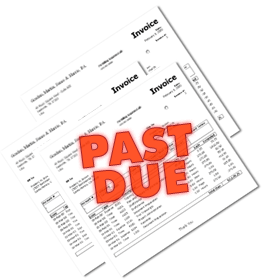(ThyBlackMan.com) On my free financial advice blog, AskTheMoneyCoach.com, I get a lot of questions about how to handle debt collection agencies. But what about you: Have you ever had an irate bill collector call you and demand payment on a debt?
If any debt collection firms are harassing you – by constantly calling you all hours of the day or night, contacting you on the job when you say you can’t  get calls there, or using profane and threatening language — such harassment is illegal and you can make them stop immediately.
get calls there, or using profane and threatening language — such harassment is illegal and you can make them stop immediately.
“Cease Contact” or “Cease and Desist” Letter
Simply write a brief letter advising them to cease all contact with you. The first sentence should say: “I am unable to pay this bill, because…” or “I refuse to pay this debt, because…” and explain your reason. You might be unable to pay because you are unemployed, sick, or going through a divorce. You might refuse to pay a debt because it’s not your responsibility, you dispute the amount being demanded, or the statute of limitations has expired on the debt (meaning the debt is too old to be legally enforced).
You also have the option of not providing a reason at all. If you provide no reason, the second sentence of your letter should state: “I hereby assert my right, under Section 805-C of the Fair Debt Collection Practices Act, to request that you cease any further communication with me.” (In the back of my book, Zero Debt, you will find a sample ‘Cease & Desist Letter.’ This basic language is all you need to communicate to debt collectors to get them off your back).
After they receive your ‘Cease & Desist’ letter, debt collection firms can’t contact you, except to indicate that the collection process against you has stopped, or that they plan to take, or recommend that your original creditor take, legal action against you, such as taking you to court. Even then, debt collectors can’t threaten legal action unless they truly intend to take it. Either way, the annoying phone calls and those harassing letters will immediately end.
“Usually (collectors) will say they’ll proceed with court action and it’s not true,” says former collection agent John Bowe. “They’ll say things like ‘Your wages will be garnished’ even if it’s not true, because collectors will walk right over a person who’s ignorant of the law. Knowing the Fair Debt Collections Practices Act is the debtor’s best tool against collection agents.”
Using the U.S. Post Office
When you send your ‘Cease & Desist’ letter, make absolutely sure that you send it ‘Certified Mail, Return Receipt Requested.’ I can’t stress enough the importance of taking this step. “You definitely want to send the letter certified mail,” cautions Bowe. “If it’s not sent certified, they’ll probably say it got lost in the mail and contact you again.”
Your certified mail receipt from the Post office will be your proof of mailing. And having that return receipt – signed by an employee at the collection agency – will bolster your claims if you get embroiled in a legal dispute.
To get proof of delivery, you must fill out Form 3811 (the return receipt form) at the Post Office. That will cost a couple bucks, but don’t fret over these charges. It’s money well spent — especially if it helps get those nasty debt collectors off your back.
Written By Lynnette Khalfani-Cox

















Leave a Reply